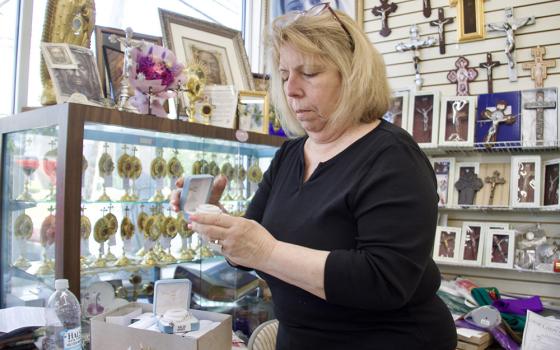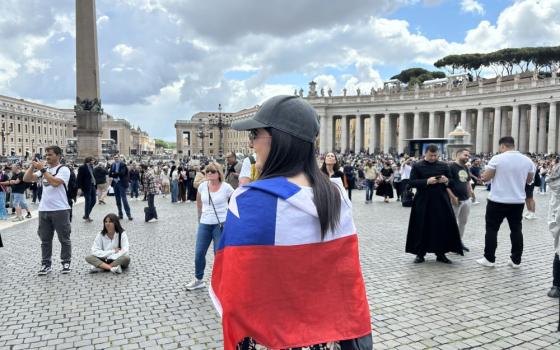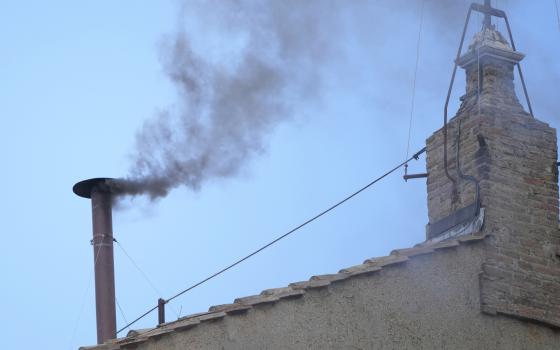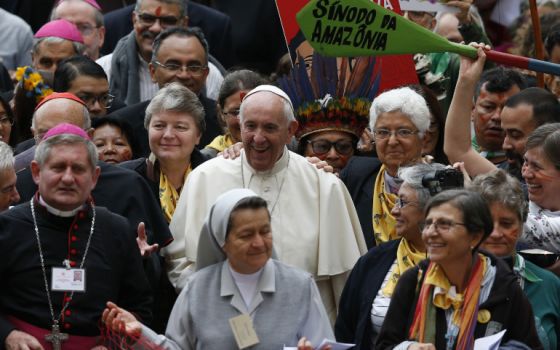Cardinal Gregorio Rosa Chávez of San Salvador, El Salvador, arrives to attend a general congregation meeting of the College of Cardinals in the New Synod Hall at the Vatican April 29, 2025. At age 82, he cannot vote in the conclave to elect a new pope. (CNS/Pablo Esparza)
With less than 48 hours before entering his first conclave, U.S. Cardinal Robert McElroy addressed the question on a lot of minds around the world: Who will be the next pope?
"I can give you no insights … not because I cannot do so by my promise, although I can't, but because I have no guess," said McElroy, archbishop of Washington, to parishioners at St. Frumentius ai Prati Fiscali, his titular church in Rome, on May 5.
The task ahead is a tremendous responsibility and also a great mystery, theologically speaking, he said, after referring to the silence cardinals must keep ahead of and during their selection of the next pope.
As the conclave nears, attacks, rumors and lies are at a boiling point in publications and social media about cardinals considered to be in the running to succeed Pope Francis, who died April 21. The biggest target seems to be frontrunner Vatican Secretary of State Cardinal Pietro Parolin. A lie that Parolin had fallen ill and needed medical assistance because of his blood pressure began making the rounds May 1 on social media and other publications.
"Not true," Vatican spokesman Matteo Bruni quickly told the press.
As the lie dissipated, speculation began about who wanted it spread and why, and that included a finger pointed at U.S.-based CatholicVote.org tied to Brian Burch, nominated by Donald Trump to become the next ambassador to the Holy See. Parolin is considered by some conservatives as too friendly toward Pope Francis' papacy. While CatholicVote.org blamed Italian media for the misinformation, Italian outlets pushed back, saying the rumor originated with CatholicVote.org.
"At the moment, the American Catholic site CatholicVote.org and several Italian news agencies seem to be in a contest to see who can offload responsibility for the rumor on the other," online publication Crux said May 3.
The incident casts a shadow over Burch's pending Senate confirmation and underscores growing tensions over Parolin's diplomatic legacy, including his role in agreements between the Vatican and China. As the blame game continues, so have attacks by the right-wing Italian press against Parolin.
Cardinal Pietro Parolin, Vatican secretary of state, arrives for the final Mass of the "novendiali," the nine days of official mourning for Pope Francis, at the Altar of the Confession in St. Peter’s Basilica at the Vatican May 4, 2025. Parolin has been the subject of false media reports about his health. (CNS/Lola Gomez)
An article that appeared in Il Tempo, a right-wing newspaper owned by a senator of the far-right Italian party Lega, aims to put Parolin at the center of Italian Cardinal Angelo Becciu's financial scandal. The publication points out that Parolin's signature appears on the final deed of the Sloane Avenue deal that got Becciu convicted of embezzlement and fraud. It insinuates Parolin played a key role in the operation.
The article calls out Parolin as one of the main architects of the failed strategy that led to heavy financial losses for the Holy See. It also mentions a lack of transparency and unclear management of funds. These articles make Parolin look increasingly vulnerable and could cause him to lose ground ahead of the conclave.
The Il Tempo article provides no evidence or on-the-record sources, referencing never-published anonymous letters and documents, which, it says, "remained in the secret rooms of St. Peter's."
Rumors and lies promoted in publications or social media could have real consequences inside the Sistine Chapel when cardinals begin voting for the next pontiff tomorrow (May 7).
Salvadoran Cardinal Gregorio Rosa Chávez, 82, cannot vote in the conclave, but has been in the general congregation gatherings ahead of the vote. He told the Jesuit-run America magazine that prelates "depend on the press to know who the candidates are, because names are not something we really talk about in there — perhaps only in small groups."
Attempts to influence the cardinals' votes, however, are not limited to mass information sources. Rosa told National Catholic Reporter May 2 that he has heard anti-Francis rhetoric going into the general congregations. Though he did not elaborate, Italian press reported May 2 that an unnamed Canadian priest told some cardinals entering the congregations: "Do not elect a modernist like Bergoglio."

U.S. Cardinal Robert McElroy gives a homily at St. Frumentius ai Prati Fiscali parish May 5, 2025, his titular church in Rome. Although he couldn’t tell them who the next pope will be, he said thoughts about future generations and youths were at the center of the cardinals’ gatherings before the conclave. (NCR photo/Rhina Guidos)
Even cardinals without a vote like Rosa can still advocate for what to look for in the next pope. Though some want a reversal of Francis, "Francisco is hard to forget," Rosa told NCR.
Supporters of Francis have also taken to the press to defend the late pope's legacy and to lobby for continuity.
Cardinal Baldassare Reina, papal vicar for the Diocese of Rome, told America magazine in a May 5 article that he's "convinced the Spirit will continue to seek and find someone with the same prophetic spirit, who will continue the reform process Pope Francis began."
He said there are still open processes on church policies, including synodality, the role of women, seminary formation and reform of the curia, all started with Francis.
By and large, cardinals, including McElroy, have painted a picture of a collegial gathering. McElroy told the St. Frumentius parishioners that young Catholics were much on the mind of cardinal electors since they are the present and future of the church.
Advertisement
On May 3, Belgian youth wrote an open letter to cardinal electors with many words of love for the late pope. Under Francis, they said, they saw a different way of being church: listening, looking for the truth, looking at those on the margins, opening doors, breaking taboos, talking about abuse and power structures and having a kinship with nature.
"Don't just elect a pope," they told cardinal electors. "Pick a pilgrim. A pastor. A builder of peace."
Camillo Barone and Christopher White contributed to this story.
The National Catholic Reporter's Rome Bureau is made possible in part by the generosity of Joan and Bob McGrath.







